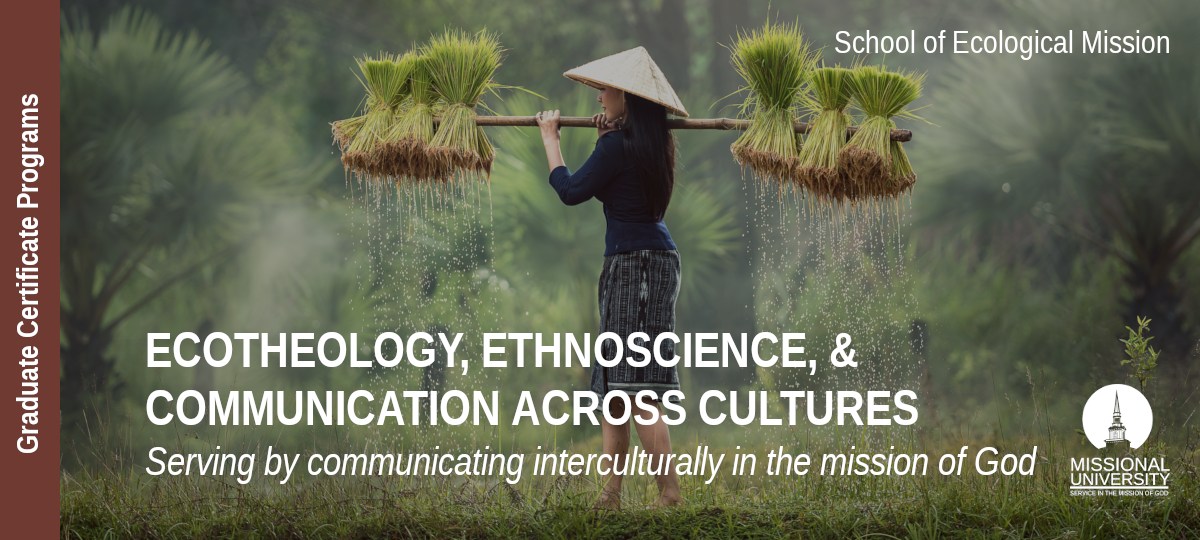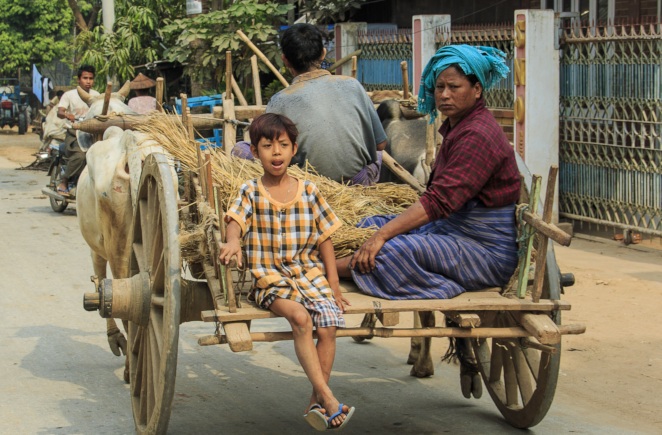
Online Graduate Certificate in
Ecotheology, Ethnoscience & Communication Across Cultures
☀ Totally Unique Program = only available at Missional University
Expand Your Missional Service Today!
REQUEST INFORMATION
Ready to learn more about the
Graduate Certificate in
Ecotheology, Ethnoscience & Communication Across Cultures?
LEARN MORE NOW
The Graduate Certificate in Ecotheology, Ethnoscience & Communication Across Cultures
Program Features
-
Integrated practicums allow you to gain valuable real-world experience
-
Learn from academic practitioners from around the world
-
Credits earned in this certificate program can apply to a Missional University Master's degree program
Course Effort
Course Length
Credits Required
Program Cost
What Will I Study?
We offer the most comprehensive approach to studying the Bible, culture & the environment in the mission of God.
The Missio Dei is the work of God in the world. In this course, students will develop a theological framework for understanding God and his work in the world through an ecological perspective, demonstrating an understanding of the divine purpose for creation.
An advanced evaluation of major theories and research approaches in the field with particular attention to a critical assessment of the role of culture in contemporary communication in various cultures. The course readings, assignments and class discussions intend to prepare the student for evaluating the nexis of communication forms, cultural studies and intercultural communication approaches.
This course focuses on the intersections between contemporary environmental issues, communication dynamics, media and social change. We will explore the unique contribution that communication theory can bring to the study of “the environment” and “the natural world”. We will also consider how these perspectives can inform actionable practices that aim to bolster long-term global environmental sustainability. Case studies will cover a diverse set of environmental topics, including climate change, environmental justice, the global industrial food system, public understandings of scientific risk, human-animal relations, and environmental media and journalism. Course materials will include interdisciplinary readings – drawn not only from communication and media studies, but also political science, geography, the natural sciences and other fields – as well as relevant films, television shows, popular press articles and other multimedia materials. You will be asked to read challenging texts, engage in class discussions and exercises, reflect on a variety of media clips, and think critically about the perspectives brought into conversations by your peers. Taken together, the course will provide theoretical, methodological and practical insights into the theory and practice of environmental communication.
What are the theories and hypotheses commonly tested in ethnobiology? What types of data are collected to test these hypotheses? How are these data analyzed to understand the link between plant and culture, the way in which human, by selecting certain organs on certain plant species in specific location, and at some specific time, have shaped their environment? How environmental feedback constrained the nature and extent of human-plant interactions? The ultimate goal of this class is to guide students in conducting hypothesis/theory-driven research in ethnobiology. We will review various theories and hypotheses in ethnobiology. Second, we will learn the different methods used in ethnobotanical research and finally we will identify the major types of data commonly collected in this field and how these data are analyzed. At the end of this course students will be able to develop and test simple hypotheses in ethnobiology and discuss how they fit into the broad ethnobiology literature. Although this course method is applied to ethnobiology, the course can be of interest to students interested in learning about how to use the scientific method in biology in general.
Ethnochemistry is the study of chemical ideas found in any culture; where an appreciation of cultural heritage is preserved. This course focuses on examining the theories and methods of ethnoscience applied to understanding indigenous understandings of chemistry perspectives as a means of developing communication approaches that bridge from indigenous understanding to scientific concepts. The ultimate goal of this class is to guide students in conducting hypothesis/theory-driven research in ethnochemistry. Students learn the different methods used in ethnochemical research, identify the major types of data commonly collected in this field and how these data are analyzed. At the end of the course students will be able to develop and test simple hypotheses in ethnochemistry and utilize their findings to develop appropriate contextual communication.
Choose one below
This course is an introduction to how ancient people groups understood and related to the geology of the specific areas in which they lived. It will take a global look at how cultures over time have been influenced and shaped by their geology and use of geologic materials. Special emphasis will be placed on how these cultures interpreted geologic phenomena such has earth quakes, volcanic eruptions, and related hazards.
Ethnophysiology is a realm of ethnomedicine that focuses on the psychology, attitudes, and behaviors of an indigenous populace in a specified ethnic, racial, or cultural group regarding how its residents typically perceive human bodily functions.
Topics covered: general philosophy on measuring and counting, number system (spoken and written numbers), elementary number theory (number words, number base, modular arithmetic), fractions, estimations, geometry. These concepts will be studied from a historical perspective spanning from the early civilization, the Greek period, Hindus and Arabs, Europe and modern mathematical activities in United States, Russia, China, India and Japan
When Can I Get Started?
We offer multiple start dates each year to give you flexibility in your education, life and work schedules.
JANUARY
MARCH
MAY
AUGUST
OCTOBER
A Career in Joining the Mission of God
Is this Your Mission?
Environmental Ministry Leader, Environmental Missionary, Environmental Advocate, Environmental Public Relations Specialist, Ecomissiology Blogger, Ecomissiology Developer, Ecomissiology Educator, Ecomissiology Leader, Ecomissiology Strategist, Ecomissiology Writer, Healthcare Missionary, Community Health Ministry Leader, Community Health Worker, Community Outreach Coordinator, Healthcare Educator, Healthcare Policy Advocate, Healthcare Project Manager, Healthcare Policy Associate
Merge Your Faith, Career & Mission in Service in the Mission of God in the World
Serve in faith-based organizations including mission entities, nonprofits & NGOs, schools, churches and church groups worldwide.
Request Information Now
How Much Will it Cost?
We offer tuition based upon country of residence. According to the Human Development Index, all countries around the world fall into one of four categories:
-
(Tier 1) - Very High Human Development
-
(Tier 2) High Human Development
-
(Tier 3) Medium Human Development
-
(Tier 4) Low Human Development
Our tiered global tuition makes higher education affordable for everyone world wide.

TIER COUNTRIES
100% Tuition
$395
per credit hour
3 credit course
$1185

TIER COUNTRIES
80% Tuition
$316
per credit hour
3 credit course
$948

TIER COUNTRIES
60% Tuition
$237
per credit hour
3 credit course
$711

TIER COUNTRIES
40% Tuition
$158
per credit hour
3 credit course
$474
Tiered tuition based on country of origin and scholarships available. Find your country of residence here for more information.
Tuition may be further reduced by participating in the Sponsorship Program.
